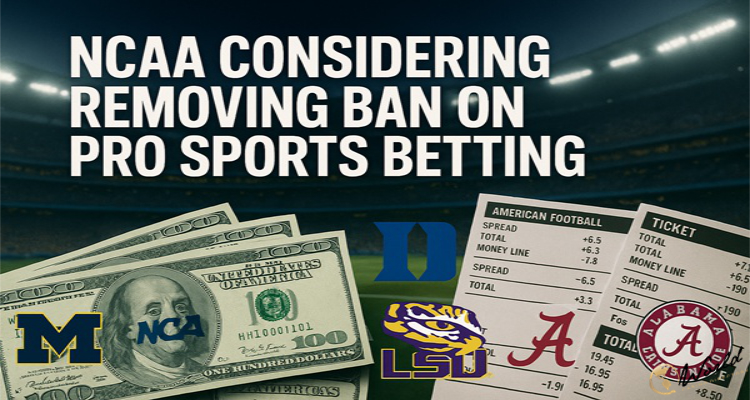The NCAA is reportedly edging closer to a pivotal change in its stance on sports betting, with a proposal in motion to lift its longstanding prohibition on wagering on professional sports by athletes, coaches, and staff.
Enforcement burden and shifting priorities:
According to a Sports Illustrated report, momentum is building within the organization, with the Division I Board of Directors already backing the move and forwarding it to the D-I Council for further consideration. A final decision could come as early as June.
Under current NCAA rules, anyone involved in college athletics is barred from betting on any professional sport that also exists at the college level—such as football, basketball, baseball, hockey, tennis, and golf. This restriction stems from the belief that such betting compromises integrity. However, the Division I board voted 21–1 during an April 21 video call to support new legislation that would remove this restriction.
The board has also reportedly directed NCAA staff to explore options such as “safe harbor,” limited immunity, or reduced sanctions for student-athletes who admit to betting and seek help for gambling issues. The college sports betting ban, however, would remain intact.
The NCAA’s ongoing reassessment of its sports wagering policies began in 2023, largely in response to the widespread legalization of betting across the U.S. The rapid expansion has outpaced the NCAA’s ability to effectively enforce its own regulations—especially when it comes to minor violations related to professional sports gambling.
Matt Banker, a college athletics consultant and former NCAA administrator, described the situation as a “cultural and philosophical recalibration.” He noted, “The world of sports wagering looks far different in 2025 than it did even ten years ago, as it’s now legal in almost 80% of the United States.” Banker emphasized that trying to monitor every bet by athletes and staff would be an overwhelming use of NCAA resources.
The potential rule change is viewed as a strategy to refocus NCAA oversight on more serious threats to college sports, such as point-shaving, prop betting manipulation, and betting on college games themselves—all of which directly impact game integrity.
Federal and NCAA investigations remain active into allegations of game-fixing in men’s college basketball. Authorities are still probing games and athletes tied to incidents like former NBA player Jontay Porter’s admitted manipulation of his on-court performance. Several Division I teams have suspended or dismissed players for betting-related infractions, often involving their own games.
In Q1 2025 alone, the International Betting Integrity Association flagged six U.S. basketball games for suspicious betting behavior, compared to five in all of 2024.
Despite these integrity risks in collegiate play, the types of infractions uncovered so far involving professional sports wagers by NCAA personnel have typically been minor and resulted in minimal penalties.
A shift toward harm reduction and realignment:
Jason Verdugo, chair of the D-I Council and athletics director at Wisconsin-Eau Claire, highlighted the importance of prioritizing athlete well-being. “Exploring the concept of a safe harbor or limited immunity for student-athletes involved with sports betting reaffirms that harm reduction and education will continue to be paramount,” he said in an April statement.
The Division III Management Council has also weighed in, expressing interest in lifting the ban for its own athletes and staff. This broader interest within the NCAA suggests a growing consensus that wagering on professional sports, when handled transparently and with safeguards, poses less of a threat than once believed.
While the NCAA considers relaxing its stance on pro sports betting, its attention remains firmly fixed on college-related wagers. Major controversies have stemmed from college game betting and manipulation—such as the high-profile case involving an Alabama baseball coach sharing internal information ahead of betting lines being set.
The NCAA is also pushing for states to remove college athlete proposition bets altogether. Such moves are aimed at protecting players from targeted harassment and preserving competitive integrity.
Meanwhile, the NCAA’s evolving relationship with the sports betting industry continues. In April, it partnered with Genius Sports to provide official data from major college tournaments—including March Madness—to sportsbooks. This partnership reflects the organization’s growing engagement with the regulated betting ecosystem.
If the D-I Council approves the proposed changes next week, the NCAA’s stance on sports betting will undergo one of its most significant transformations in recent history.


